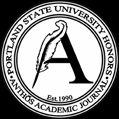Subjects
Paris (France) -- Intellectual life, Social ethics -- History -- To 1500, Church history -- 13th century
Abstract
The faculty of theology within the medieval University of Paris formed a major node within the social network of thirteenth-century Europe. Through an analysis of papal and university statutes concerning the development of a defined understanding of heresy, an overview of the historiographic methodologies traditionally used in studying such a topic, and a prosopographically-based analysis of the actions taken by Pope Innocent III and a small circle of theologians at Paris, we hope to come to a more clarified understanding of the political motivations which drove academic and papal reform within the thirteenth century. More specifically, this study aims to examine how the papacy worked to directly alter both the curriculum and the faculty at the University of Paris, in order to utilize the department of theology therein as a political platform for the pope's own cause: an effort to coerce the throne of France to go to war with the heretics of Occitania.
I am immeasurably grateful for the continued support and insight given to this ongoing project by Dr. John S. Ott, and for his mentorship throughout the research herein presented. I would also very much like to thank Dr. W. H. York, without whose extended discourses I never would have been able to complete even such a small article. The seeds you have planted now bear fruit.
DOI
10.15760/anthos.2015.3
Creative Commons License

This work is licensed under a Creative Commons Attribution-NonCommercial-Share Alike 4.0 International License.
Persistent Identifier
http://archives.pdx.edu/ds/psu/15966
Recommended Citation
Fleming, Andrew X.
(2015)
"Knowledge is Power: The Political Influence of the Chanter Social Circle at the University of Paris (1200-1215),"
Anthós:
Vol. 7:
Iss.
1, Article 3.
https://doi.org/10.15760/anthos.2015.3
Included in
European History Commons, History of Religion Commons, Intellectual History Commons, Medieval History Commons
